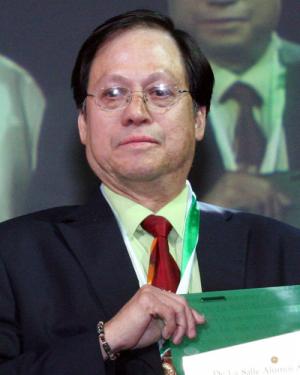Oposa, Antonio A. Jr.
BSBA 1975
2008
DLSAA Distinguished Lasallian Awardee
Antonio A. Oposa, Jr., the country's f o r e m o s t environmental lawyer, studied at De La Salle University in Manila and graduated with a business administration degree in 1975. At the University of the Philippines, he organized the UP Law Forensic Society and graduated from the UP College of Law in 1982 and passed the bar that same year. In 1985, he married Greely Remulla (of the Cavite political clan). They have four children, Juan Antonio, Anna Rosario, Jose Alfonso and Jaime Agustin. In 1988, Oposa got a scholarship to study energy planning and the environment at the University of Oslo in Norway. He headed for Harvard for masteral Studies in environmental law and in 1998, while still in Harvard, he wrote a paper that became the foundation for citizens' suits and for provisions in the Clean Air Act and the Solid Waste Management Act. He is the author of “The Laws of Nature and Other Stories,” “A Legal Arsenal for the Philippine Environment” and “Environmental Law in
the Philippines.” He pioneered the practice of Environmental Law in the Philippines and is one of Asia's leading voices in the international arena of Environmental Law. He is a recipient of The Outstanding Young Man of the Philippines Award (TOYM) in the field of law and the highest United Nations environmental award, the U.N. Environmental Programme (UNEP) Global 500 Roll of Honor. He is the only Asian member of the Executive Committee of the Washington DC-based International Network for Environmental Enforcement, Chairman of the newly-created National Environmental Action Team of the Integrated Bar of the Philippines, and Chairman and President of the Bank of Ormoc. Tony teaches environmental law at UP and the Philippine Judicial Academy and serves as chair of the Philippine Bar ASSociation Environment Action Team. Tony is also the President of The Law of Nature Foundation (TLNF), the international name of the Batas Kalikasan Foundation, a network of volunteer citizens who work for the conservation, protection and restoration of the Earth, especially the Visayan Seas. Through TLNF, the local community is taught on marine ecology and proper conservation and at the same time providing the needed social, legal, financial, and
physical engineering to ensure the mindshift from resource extraction economics to restorative economics. In 1999, Tony filed a case before the Imus, Cavite court to compel government agencies to clean up the bay. The case was elevated to the Supreme Court. On December 18, 2008, after almost ten years, the high court ordered government agencies to immediately undertake moves to clean up the bay. The ruling ordered 12 government agencies to restore its waters to a quality good enough for contact recreation. The Supreme Court decision also ordered the implementation of the Solid Waste Management Law, the installation of sewerage systems and the removal of squatters along canals and riverbanks that feed into the Manila Bay. The work does not end here for Tony. He called on other lawyers and citizens to help in monitoring the clean-up. According to Tony, members of the Integrated Bar of the Philippines and Philippine Bar Association met recently to form teams to monitor compliance by government agencies with the Supreme Court order. He continues to serve farmers' and fishermen's groups pro bono and acts as consultant to governments and international agencies.
The fish, as he said, cannot pay his fee. (condensed from articles written by Nicelle Lucero, Alcuin Papa (Philippine Daily Inquirer) and from http://www.truthforce.info/?q=node/view/1845)





